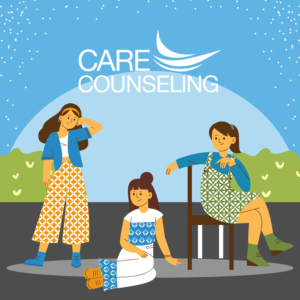 At CARE Counseling, therapists are experts in mental health, ready to work with you to understand the challenges that you are facing, establish a positive therapeutic relationship, and work towards a plan to achieve your goals. This includes working with your child, teen, or family. Since mental health impacts families and relationships, we want to help support and strengthen the family unit. This may include individual counseling for yourself, your child, or multiple people within the family.
At CARE Counseling, therapists are experts in mental health, ready to work with you to understand the challenges that you are facing, establish a positive therapeutic relationship, and work towards a plan to achieve your goals. This includes working with your child, teen, or family. Since mental health impacts families and relationships, we want to help support and strengthen the family unit. This may include individual counseling for yourself, your child, or multiple people within the family.
While therapists assess and treat mental health symptoms, biological, psychological, and social [biopsychosocial] factors are viewed as interconnected and taken into consideration throughout all stages of the therapeutic process.
Biological-factors-affecting-child-development includes genetic predisposition to mental health, neurochemistry, gender, nutrition, and overall physical health. Psychological-factors include one’s beliefs about mental health, personality, thoughts and feelings, and coping skills. Social-determinants-of-health includes relationships with family and peers, education, family circumstances, and traditions.
When assessing mental health, important considerations include age, ability, race, ethnicity, gender identity, sexual orientation, socio-economic status, and religion/ spirituality in addition to areas such as developmental history, medical history, trauma history, family dynamics, social relationships, and educational experiences.
A therapist specialized in children’s mental health can help assess the nature of the concerns using a biopsychosocial framework to help determine appropriate options to support the child and their caregiver(s).
For example, a parent/ caregiver may seek therapy for a child due to concerns of increased fear. The parent may notice mental health and/ or physical symptoms such as anxiety, trouble sleeping, headache, or stomachaches. Genetic predisposition may increase the likelihood of developing certain mental health conditions and the body’s physiological response to fear can trigger somatic [body] symptoms.
Depending on the child’s age, certain childhood fears are common such as fear of the dark or fear of monsters. However, fears may also be considered developmentally inappropriate and excessive. There may be common fears among children, while others may be more specific within a particular cultural group. There may be fear concerning separation from an attachment figure, as in separation-anxiety-disorder, or fear of specific objects or situations, as in phobias. Fear may be a response to a highly stressful or traumatic event, adjustment-disorders, or post-traumatic stress disorder (PTSD). Fear may be in response to experiences of abuse, witness to violence, and fear of the world feeling unsafe.
A therapist will explore biopsychosocial factors and how these may be impacting the presenting concern by identifying risk factors that may be associated with the development of fear and identifying protective factors that build resilience and aid in coping. A child’s family, social, and community supports can contribute to these experiences in both positive and negative ways and the goal would be the build on the positive-protective factors to reduce vulnerability to worsening symptoms.
A thorough understanding of a child’s experience and the biopsychosocial factors that impact one’s mental health can help both the parent/ caregiver and therapist collaboratively work together to develop a plan. If your child or teen is currently struggling and you are seeking a therapist specializing in children’s mental health, click HERE.
Written By : Charlotte Johnson, MA, LPCC
We’re Here to help
Our wellness experts will be happy to take care of you. You can CLICK HERE to schedule an appointment now or call (612)223-8898.
Meet Clinicians
We’re united by our commitment to providing effective, relevant, and innovative mental health support at all stages of your journey. Click Here to find out more about who we are, where we come from, and how we live out CARE’s mission every day.
The professionals at CARE are actively collecting and creating resources to help with what you need. We’re Here for You.



